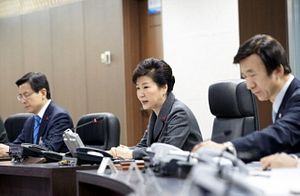Amid the steady stream of nuclear tests, missile launches, and human rights violations that come out of North Korea, it is perhaps understandable that the regime in Pyongyang tends to monopolize the attention of the international community when it comes to the Korean Peninsula. However, this singular focus on North Korea’s misdeeds has helped mask the increasingly disturbing developments taking place on the other side of the demilitarized zone (DMZ), as the actions of South Korean President Park Geun-hye during the first three years of her administration raise serious concern that the government in Seoul has embarked on a systematic rollback of the hard-won democratic gains that the country has enjoyed since the 1980s.
Park originally came to power in 2013 following a closely contested election in which the country’s National Intelligence Service unlawfully interfered in the political process by using social media to boost her candidacy and paint her opponent, Moon Jae-in, as jongbuk (pro-North) and a threat to national security. Since then, she has overseen a series of initiatives that call into question her commitment to democracy. In 2013, she moved to have a fringe, left-wing political party disbanded by the Constitutional Court. When the Court complied with her a year later by outlawing the United Progressive Party, it marked the first such time that a political party had been outlawed in the country since the 1950s. The vehicle used to accomplish this was the controversial National Security Law, which the Park administration has shown no signs of attempting to amend, despite long-standing international criticism. Indeed, the government has continued to prosecute individuals, particularly journalists, under this statute in recent years.
The president’s intolerance for dissenting political views has manifested itself in other ways as well. After the Sewol ferry sinking in 2014, a country with an already strong set of internet controls increased monitoring for ‘online slander and rumors’ and stepped up prosecution of those who were deemed to have violated the strict laws regulating defamation. The government has also authorized a heavy handed approach to discourage street protests, which have broken out with increasing frequency over recent efforts to standardize history textbooks in schools and weaken protections for workers’ rights at some of South Korea’s largest companies. This crackdown sparked criticism earlier this year from UN Special Rapporteur Maina Kiai, who pointed out that street protests played a dominant role in the country’s transition to democracy, and lamented the fact that “freedom of assembly is gradually crumbling.”
Rather than heeding Kiai’s call to implement recommendations that safeguard the right to peaceful demonstration, the administration has continued to press ahead in a different direction. The latest move was the passage of a long-stalled bill which will greatly expand the power of the NIS to wiretap phones, collect personal information on suspected terror suspects, and establish a so-called, “anti-terror center” under the direct control of the Prime Minister’s Office. Despite an eight-day filibuster from opposition parties, by far the longest in South Korean history, the bill was forced through Parliament by the majority Saenuri Party earlier this month.
The legislation, which was ostensibly designed to protect the country against North Korean espionage and the threat of a Paris-style attack, had been decried by opponents worried about the potential for agency intrusions into personal privacy. The bill’s vague definition of terrorism has also created fears that, rather than exclusively targeting legitimate threats to the state, the law could end up being used to intimidate anyone who runs afoul of the government. Given the notorious track record of the NIS to stray beyond the bounds of its mandate – a record which led a massive curtailment of the agency’s responsibilities during the Roh Moo-hyun administration – these concerns would seem to be well-founded.
In a broader sense, the legislation fits into a pattern of behavior which portrays a government far more interested in stifling dissent and placing limits on individual liberties than one which embraces the values crucial to sustaining a vibrant democracy. An administration which came to power with the assistance of a politicized intelligence service has gone about emboldening that same agency, rather than working to rein it in. In the short term, this may well lead to a situation in which would-be dissenters decide to self-censor out of fear of prosecution or being investigated as potential terrorists.
In the longer term, however, it is encouraging to see that South Korea’s squabbling opposition factions now have an issue to rally around in the lead-up to the legislative elections this April. For the first time since Park was elected, South Koreans will have the opportunity to decide whether they agree with the backsliding that has taken place under their current government, or if they would like to see their nation begin to move forward again as one of Asia’s leading democracies.
Geoffrey Fattig is a researcher at UC San Diego focusing on South Korean politics and inter-Korean relations. He blogs at politripper.com.

































